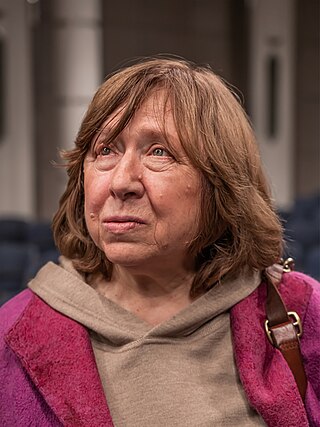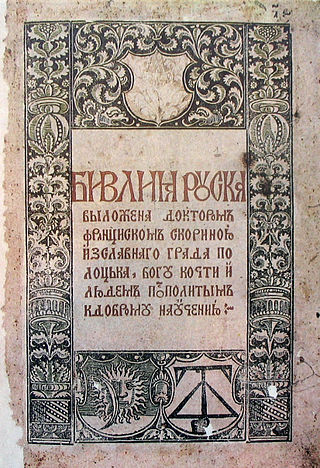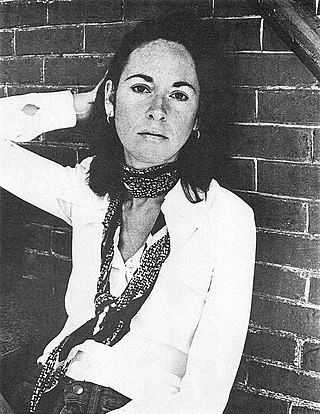
Aleksandr Mikhailovich Adamovich was a Soviet Belarusian writer, screenwriter, literary critic and democratic activist. He wrote in both the Russian and Belarusian languages.

Svetlana Alexandrovna Alexievich is a Belarusian investigative journalist, essayist and oral historian who writes in Russian. She was awarded the 2015 Nobel Prize in Literature "for her polyphonic writings, a monument to suffering and courage in our time". She is the first writer from Belarus to receive the award.

Voices from Chernobyl: The Oral History of a Nuclear Disaster, published as Chernobyl Prayer: A Chronicle of the Future in the United Kingdom, is a book about the Chernobyl disaster by the Belarusian Nobel Laureate Svetlana Alexievich. At the time of the disaster, Alexievich was a journalist living in Minsk, the capital of what was then the Byelorussian Soviet Socialist Republic. Alexievich interviewed more than 500 eyewitnesses, including firefighters, liquidators, politicians, physicians, physicists, and ordinary citizens over a period of 10 years. The book relates the psychological and personal tragedy of the Chernobyl accident, and explores the experiences of individuals and how the disaster affected their lives.

Belarusian literature is the writing produced, both prose and poetry, by speakers of the Belarusian language.

The 2016 Nobel Prize in Literature was awarded to the American singer-songwriter Bob Dylan "for having created new poetic expressions within the great American song tradition". The prize was announced by the Swedish Academy on 13 October 2016. He is the 12th Nobel laureate from the United States.

The 2010 Nobel Prize in Literature was awarded the Peruvian writer Mario Vargas Llosa "for his cartography of structures of power and his trenchant images of the individual's resistance, revolt, and defeat." The prize was announced by the Swedish Academy on 7 October 2010. He is the first Nobel laureate in Literature from Peru and the fifth Latin American to become one after 1982 Colombian laureate Gabriel García Márquez and 1971 Chilean laureate Pablo Neruda.

The 2018 Nobel Prize in Literature was awarded to the Polish writer Olga Tokarczuk "for a narrative imagination that with encyclopedic passion represents the crossing of boundaries as a form of life." The prize was announced the following year by the Swedish Academy on 10 October 2019. Tokarczuk is the fifth Nobel laureate in Literature from Poland writing in Polish, after the poet Wisława Szymborska in 1996, and Czesław Miłosz in 1980.

The 1982 Nobel Prize in Literature was awarded to the Colombian writer Gabriel García Márquez (1927–2014) "for his novels and short stories, in which the fantastic and the realistic are combined in a richly composed world of imagination, reflecting a continent's life and conflicts."

The 2017 Nobel Prize in Literature was awarded to the British novelist Kazuo Ishiguro "who, in novels of great emotional force, has uncovered the abyss beneath our illusory sense of connection with the world." The prize was announced by the Swedish Academy on 5 October 2017.

The 2006 Nobel Prize in Literature was awarded to the Turkish writer Orhan Pamuk "who in the quest for the melancholic soul of his native city has discovered new symbols for the clash and interlacing of cultures."

The 2020 Nobel Prize in Literature was awarded to the American poet Louise Glück (1943–2023) who the Swedish Academy members praised "for her unmistakable poetic voice that with austere beauty makes individual existence universal." The winner was announced on October 8, 2020, by Mats Malm, permanent secretary of the Swedish Academy. She is the 13th Nobel laureate in Literature from the United States after 2016 laureate Bob Dylan and 1993 laureate Toni Morrison.

The 2022 Nobel Prize in Literature was awarded to the French author Annie Ernaux "for the courage and clinical acuity with which she uncovers the roots, estrangements and collective restraints of personal memory". It was announced by the Swedish Academy on 6 October 2022. Ernaux was the 16th French writer – the first Frenchwoman – and the 17th female author, to receive the Nobel Prize in Literature.

The 2021 Nobel Prize in Literature was awarded to the Tanzanian-born British novelist Abdulrazak Gurnah who the Swedish Academy members praised "for his uncompromising and compassionate penetration of the effects of colonialism and the fate of the refugee in the gulf between cultures and continents." The winner was announced on October 7, 2021, by Mats Malm, permanent secretary of the Swedish Academy.

The 2014 Nobel Prize in Literature was awarded to the French novelist Patrick Modiano "for the art of memory with which he has evoked the most ungraspable human destinies and uncovered the life-world of the occupation." He became the 15th Frenchman to receive the Nobel Prize for Literature after J. M. G. Le Clézio in 2008.

The 2009 Nobel Prize in Literature was awarded to the Romanian-German author Herta Müller "who, with the concentration of poetry and the frankness of prose, depicts the landscape of the dispossessed." She is the ninth German-language writer to become a recipient of the prize after Günter Grass in 1999.

The 2008 Nobel Prize in Literature was awarded to the French novelist Jean-Marie Gustave Le Clézio, better known with his pen name J. M. G. Le Clézio, as an "author of new departures, poetic adventure and sensual ecstasy, explorer of a humanity beyond and below the reigning civilization." He became the 14th French-language author to receive the Nobel Prize for Literature after Claude Simon in 1985 and was followed later by Patrick Modiano in 2014.

The 2007 Nobel Prize in Literature was awarded to the British novelist Doris Lessing (1919–2013) as "that epicist of the female experience, who with scepticism, fire and visionary power has subjected a divided civilisation to scrutiny." Lessing was the oldest person ever, at age 88, to receive the Nobel Prize in Literature followed by the German historian Theodor Mommsen, who received the prize at age 85. She is also the third-oldest Nobel laureate in any category. She became the 11th woman to be awarded the prize.

The 2013 Nobel Prize in Literature was awarded to the Canadian writer Alice Munro (1931–2024) as "master of the contemporary short story." She was the first Canadian and the 13th woman to receive the prize.

The 2004 Nobel Prize in Literature was awarded to the Austrian writer Elfriede Jelinek "for her musical flow of voices and counter-voices in novels and plays that with extraordinary linguistic zeal reveal the absurdity of society's clichés and their subjugating power". She is the tenth female and the first Austrian Nobel laureate followed by Peter Handke in 2019.

The 1996 Nobel Prize in Literature was awarded to the Polish poet Wisława Szymborska (1923–2012) "for poetry that with ironic precision allows the historical and biological context to come to light in fragments of human reality." Szymborska is the 9th female recipient and the 5th Nobel laureate from Poland after Czesław Miłosz in 1980.
























